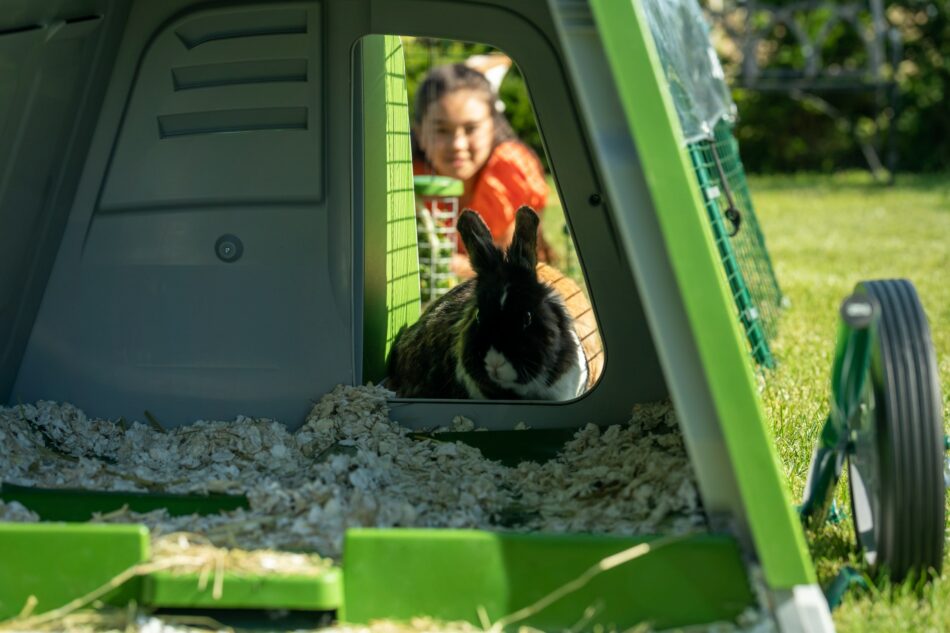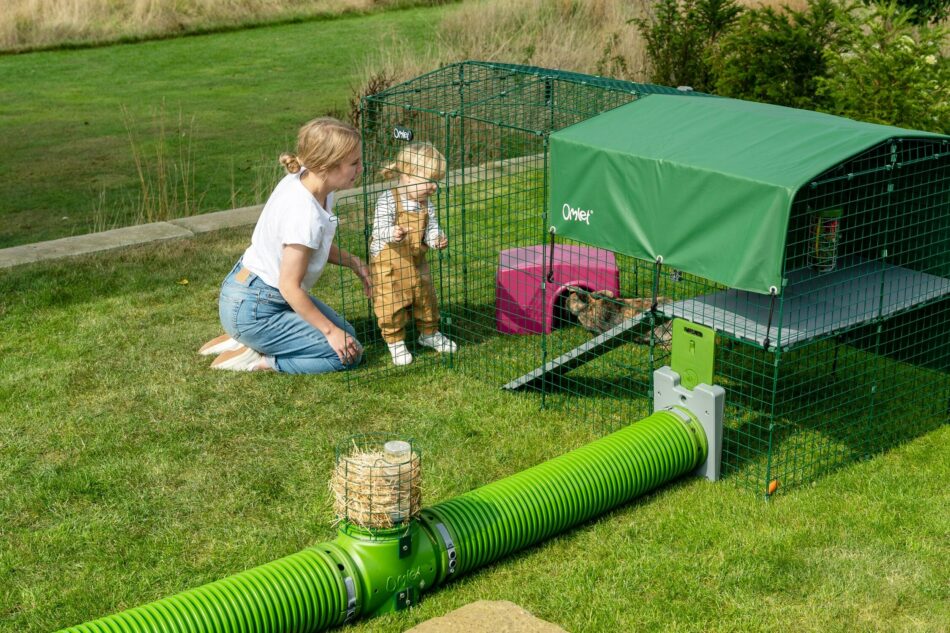Rabbit care 101
Thinking about adding rabbits to your family, or wanting to deepen your understanding of these lively pets? Learn everything you need to know about bunnies in rabbit care 101. From their care to navigating their personalities, here’s the scoop on keeping rabbits healthy and happy to forge bunny-bonds that will last a lifetime.
Rabbits as pets
There are many things to love about having rabbits as pets. Rabbits are intelligent and emotional animals that bring a lot of personality and character to the lives of their families. They’re energetic, enigmatic, and entertaining companions to their owners. While beginners can care for rabbits, their strong legs and quick movements warrant the need for older primary caregivers. Children can enjoy watching their bunnies bound and play in their setup, or sit with them for visits and playtime.
Like other pets, rabbits each have their own personalities. Some may be inclined to sit and snuggle, while others prefer to display their affection through avid play. No matter what kind of bunny you bring home, their setup will need to be safe and supportive. Learn how to set up for success with your rabbits, and how to care for them to help them live their best lives.
Diet
Did you know that the digestive system of a rabbit actually resembles that of a horse? They have an organ called the “cecum” that acts much like a rumen of a cow — but instead of it being at the beginning of their digestive tract like cows, it’s at the end like a horse. Because rabbits have cecums, and because of its location, they need quality fiber in their diet to keep this microbe-rich organ working properly.
The majority of your rabbits’ diet — around 85% — should be in the form of high quality hay. Timothy hay is a popular, healthy choice that is readily available, and should be offered free-choice. Other hay options for your bunnies include:
- Orchard Grass Hay
- Oat Hay
- Meadow Hay
In addition to free-choice hay, you should offer your bunnies a small amount of feed pellets each day. Each rabbit requires a different amount of feed based on their age, breed, and size, but a general rule of thumb is around ¼ cup per 5 lb rabbit a day. The remainder of your bunnies’ nutrition should come from fresh veggies — preferably leafy greens. Small amounts of fruit can be offered once or twice a week, but should be given as treats and not part of their usual diet.
Along with their food, your rabbits will also need fresh water daily. Hydration is a vital part of bunny digestion, and is essential for keeping their bodies regulated. You can offer water in a bottle that hangs inside of your rabbits’ hutch or in a shady part of their run. But some owners find that their bunnies drink more from a crock or a bowl. Depending on how many rabbits you have and how much they drink you may need to provide multiple water sources throughout their setup — especially in warmer weather.
Housing
Rabbits thrive in as much space as possible, and feel most at home in their natural element. Domesticated rabbits share many behaviors and instincts with their wild counterparts, but need the space and setting to support them. This is why housing your rabbits outdoors is the best option.*
The rocky relationship between rabbits and gardens is what most people may call to mind when they think of outdoor bunnies. But while this notion has some merit, the right setup and planning can ensure that your rabbits can live in harmony with your landscaping. The other concern with keeping rabbits outdoors is the threat of predators. And while this is indeed a reality that most rabbit owners will face, predators can be thwarted with the right setup.
To provide a safe, supportive environment for your rabbit outside, they will need:
- An easy-to-clean, insulated rabbit hutch
- Strong, secure run with anti-dig flooring
- Weather protection
These bunny-basics will enable your rabbits to live outside all year round, and thrive in their element while being protected from the elements. Expect to spot clean your rabbits’ hutch daily, with a deep cleaning once a week. Choose absorbent bedding like pine shavings or pellets during the summer months, and opt for warmer options like straw during the winter.
*Some rabbits have special considerations that may require them to be kept in a more climate controlled environment, especially during extreme weather and temperatures. This is true for rabbits that have:
- Thick coats like Angoras
- Underlying health conditions or injuries
- Trouble regulating their temperature, like very young or very old rabbits
Social needs
In the wild, rabbits live in large groups called colonies. They create extensive tunnels and burrows that make up their warrens, and interact with each other throughout the day. This social structure provides safety and satisfies the need for interaction. Similarly, most pet rabbits feel most comfortable when they have a companion.
Rabbits should be kept in pairs, with few bunnies being an exception. More territorial rabbits may need to be housed alone, and intact males should never be kept together. The easiest, most natural pairing is a neutered male with a female (even better if the female is spayed). Other successful pairings include females or neutered males, but they should ideally be littermates raised together, or introduced at a young age. Introducing older rabbits is possible, but it takes more time and a practiced hand.
While rabbits kept in pairs are usually happier than those housed alone, bunnies also benefit from interacting with their humans. They’re capable of forming close bonds with their caretakers, similar to those of dogs and cats. You’ll see your rabbits grooming each other, sleeping together, or playing a game of chase, but they’ll soon recognize you as the bringer-of-food and back-scratcher-extraordinaire. Aim to spend at least 20 minutes a day with your rabbit. Playing games with your rabbits or simply sitting with them every day will go a long way in building a bond that will last a lifetime.
Healthcare
When properly cared for, rabbits are healthy, hardy animals. In addition to their housing and diet, here are some healthcare considerations for pet rabbits:
- Brushing their coats and trimming their nails as needed
- Establishing care with a veterinarian that is familiar with treating rabbits
- Having them spayed or neutered at the appropriate age
Deworming and vaccination options for rabbits vary depending on your location, so it’s important to discuss these with your veterinarian.
Rabbits also have incisors that grow continuously, so providing hay and other chewing elements will help keep their teeth in check. If your rabbits don’t have enough to gnaw on, they may need to have their teeth trimmed by a veterinarian.
Flystrike in rabbits is a condition that outdoor rabbits should be monitored for. While uncommon in healthy, well-cared for rabbits, flystrike can cause serious illness. Performing regular rabbit health checks and keeping their hutch and run clean will help prevent flystrike.
Other considerations
While not necessarily a necessity, accessories can elevate your bunnies’ — and your — experience. Consider adding these fun and engaging elements to your rabbits’ setup:
- Zippi Rabbit Tunnel System
- Caddi Rabbit Treat Holder
- Zippi Rabbit Platforms and Ramps
- Zippi Rabbit Playpens
- Zippi Rabbit Shelters
These accessories have been designed to foster natural behaviors of rabbits, and provide endless opportunities for exercise and excitement.
Omlet and your rabbits
Keeping rabbits as pets is a rewarding experience that can provide years of close companionship. With Omlet, your rabbits can thrive outside in their natural environment while helping you with your workload. Our easy-to-clean rabbit hutches and spacious rabbit runs make caring for your rabbits a breeze. And, with exciting rabbit accessories, you can round out their setup to create the ultimate bunny abode. So, are you ready for rabbits? Choose Omlet for your rabbits, and keep them confidently for years to come.
This entry was posted in Rabbits


